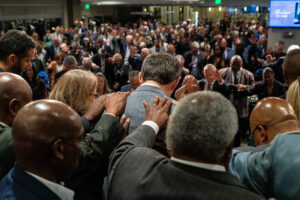
WASHINGTON (BP)–An Internet “911 number” was among several initiatives announced Dec. 2 by Vice President Al Gore during a three-day “Internet/Online Summit” in Washington.
In an address to the summit, sponsored by a coalition of high-tech companies and public policy groups, Gore announced:
— a “cybertips line — in effect, a 911 number for the Internet,” as he described it, which will function “like an emergency hot line or a crimestoppers tip line,” taking reports on illegal Internet activity related to child pornography and predation.
Gore said the 911-type project is sponsored by the National Center for Missing and Exploited Children, “with a sizable grant from the Department of Justice.”
“It is a warning to criminals,” Gore said, “and a promise to parents: There are Internet police for those activities that are illegal, and they will capture and punish those who would use the Internet to harm and hurt our children.” He cited no specific date for the 911 launch.
— a new “Parents Guide to the Internet” prepared, at President Clinton’s request, by the Department of Education.
According to Gore’s office, the document is available on the Internet at www.ed.gov/pubs/parents/internet.
Gore said the administration hopes the parent guide will be “a valuable resource for parents who want to understand how they can play a responsible role as parents in helping to protect their children against inappropriate sites and inappropriate material, and finding the exciting opportunities that really are available for educational and cultural purposes on the Internet.”
— a new national public awareness campaign called “Think, Then Link,” which will feature a town hall meeting, scheduled for next fall, to be held in schools across the country designed, Gore said, “to educate adults and children about how to create a safe online environment,” followed by local town hall meetings at libraries, schools and community centers across the country.
— a new agreement by the leading Internet service provider associations to cooperate with law enforcement authorities on a “zero-tolerance policy” against child pornography.
“Internet service providers will be working closely with law enforcement to report and pursue any suspicious activity,” Gore stated.
Comment from family advocacy groups, such as the Family Research Council, American Family Association and Enough is Enough, about the Gore initiatives was not available at Baptist Press’ deadline Dec. 3.
Gore also reported that the Department of Commerce will host Internet/online conferences early next year “to focus on issues of quality, content, access, privacy, marketing and advertising for children.” The first conference, slated Feb. 25-27, will focus on access, Gore said.
In general comments to the summit, Gore said 10 million children are already on the Internet, “and that’s four times as many as just a few years ago. In a short time, more young people will be connected to the Internet than any other segment of the population.”
Unfortunately, he said, “There are too many families with gruesome stories to tell about how their children have been exposed to material that is deeply offensive to those families and, in the view of the parents, harmful to those children.”
Concerning “censorship” issues, Gore stated, “Some say we should refrain from any action, that all action to block children’s access to objectionable content amounts to censorship. To them I say, blocking your own child’s access to objectionable Internet content is not censoring; that’s called parenting. And it is essential. And a parent’s right to block offensive speech is as fully protected by the First Amendment as the right to issue that speech.
“There is a view, which I consider an absurd view, that defines ‘children’ as ‘nothing more than miniature adults,’ not really in need of special protection from material that their parents believe they’re not ready to process and handle.”
On the other hand, Gore said, “still others say that government must immediately come in with a heavy hand and outlaw certain activities on the Internet. Well, to them I say we need to listen to the justices of the Supreme Court and to the United States Constitution that binds them. … And the court has ruled that we must find methods to keep our children safe that do not infringe on the free speech of others.”
Gore proposed “a third way, an American way: allow the industry to take the lead, with the help and guidance of government, advocacy groups and families, to provide parents with the education and the tools they need to preserve both safety and freedom on the Internet.”
Gore commended the Internet/online industry for its efforts to date in “designing the tools to guide children away from content that their parents consider harmful and steer them toward content that their parents consider helpful.”
“But you must do more,” Gore said to the industry.
“The solution that you’re developing must be a solution that works, not just a solution that theoretically could work; it must actually work in the experience and in the lives of families in this country,” he said.
“There is a danger for this effort to degenerate into a discussion about how to avoid regulation,” the vice president continued. “To be successful, it must be elevated to a discussion about how to meet the needs of America’s families. Industry will never be able to meet those needs unless it devotes the same resources and commitment to designing parental controls that it would devote to the design and launch of any new product.”
Gore said the Internet is “not a luxury or a diversion; it is an essential tool for children. And its use is fast becoming an essential skill for adults. That is why we’re committed to connecting every classroom and school library to the Internet by the year 2000. We have already connected 65 percent of our schools in a very short period of time. We’re ahead of schedule in meeting our broader goals.”
Polly House contributed to this story.















